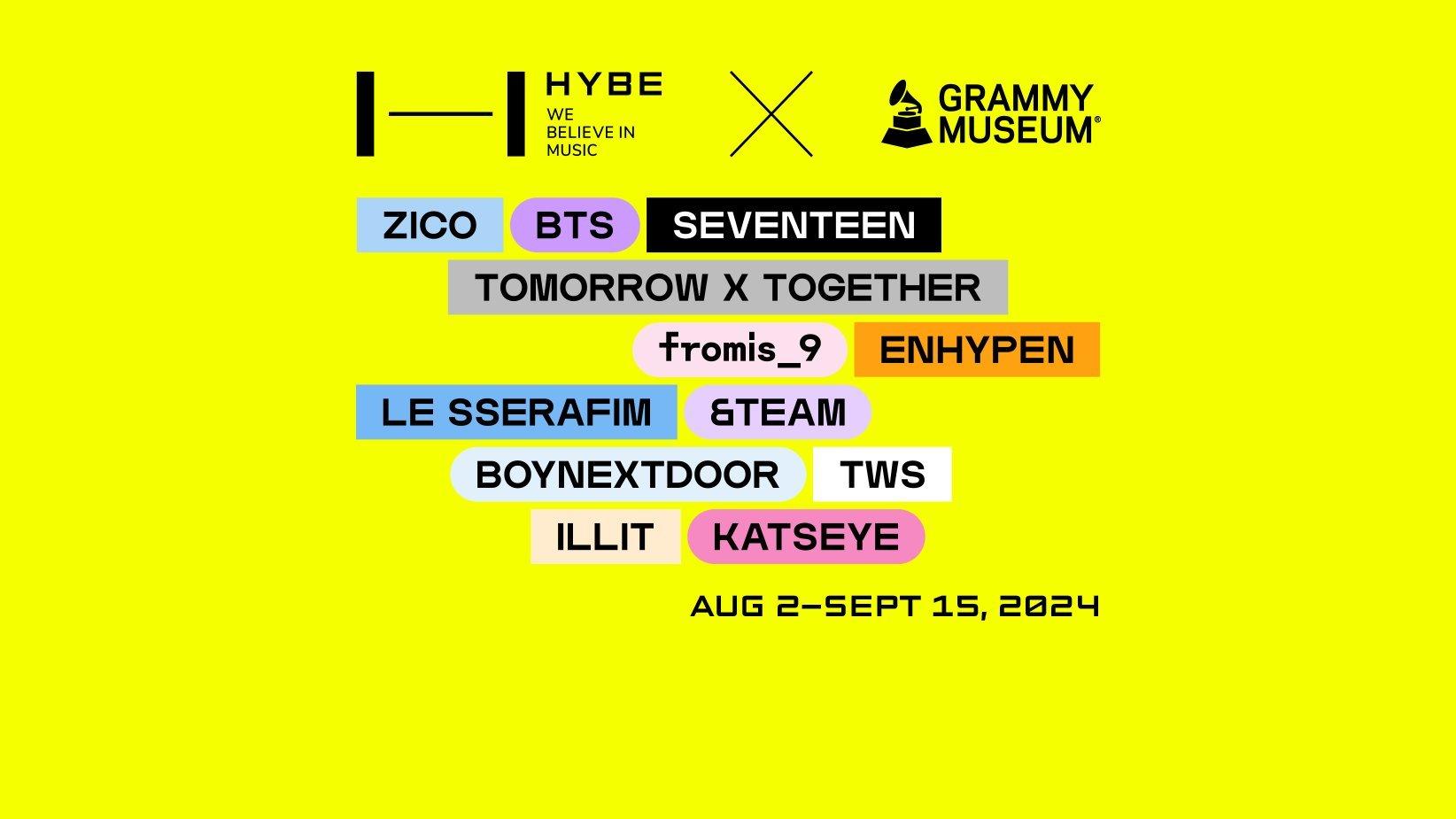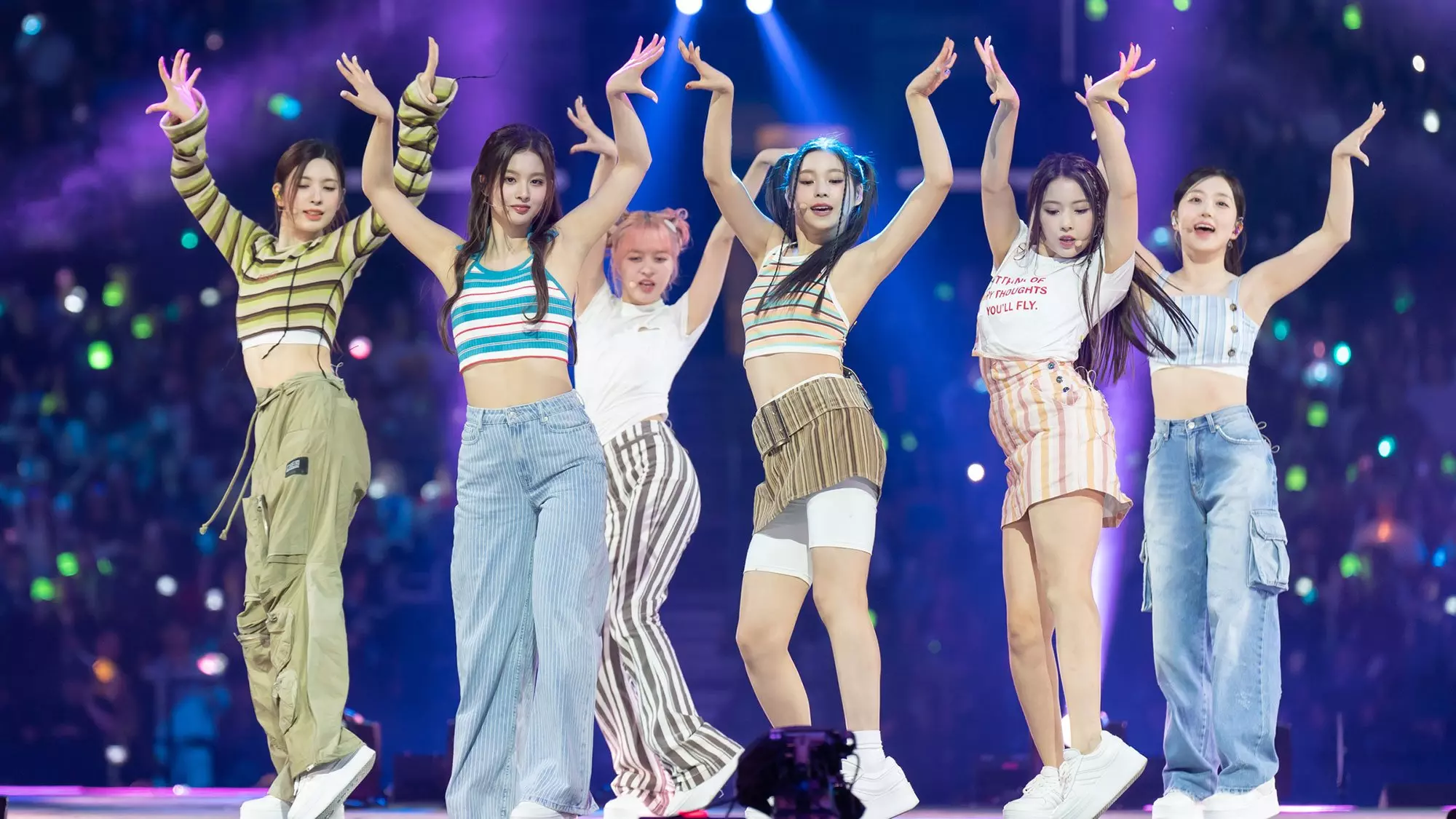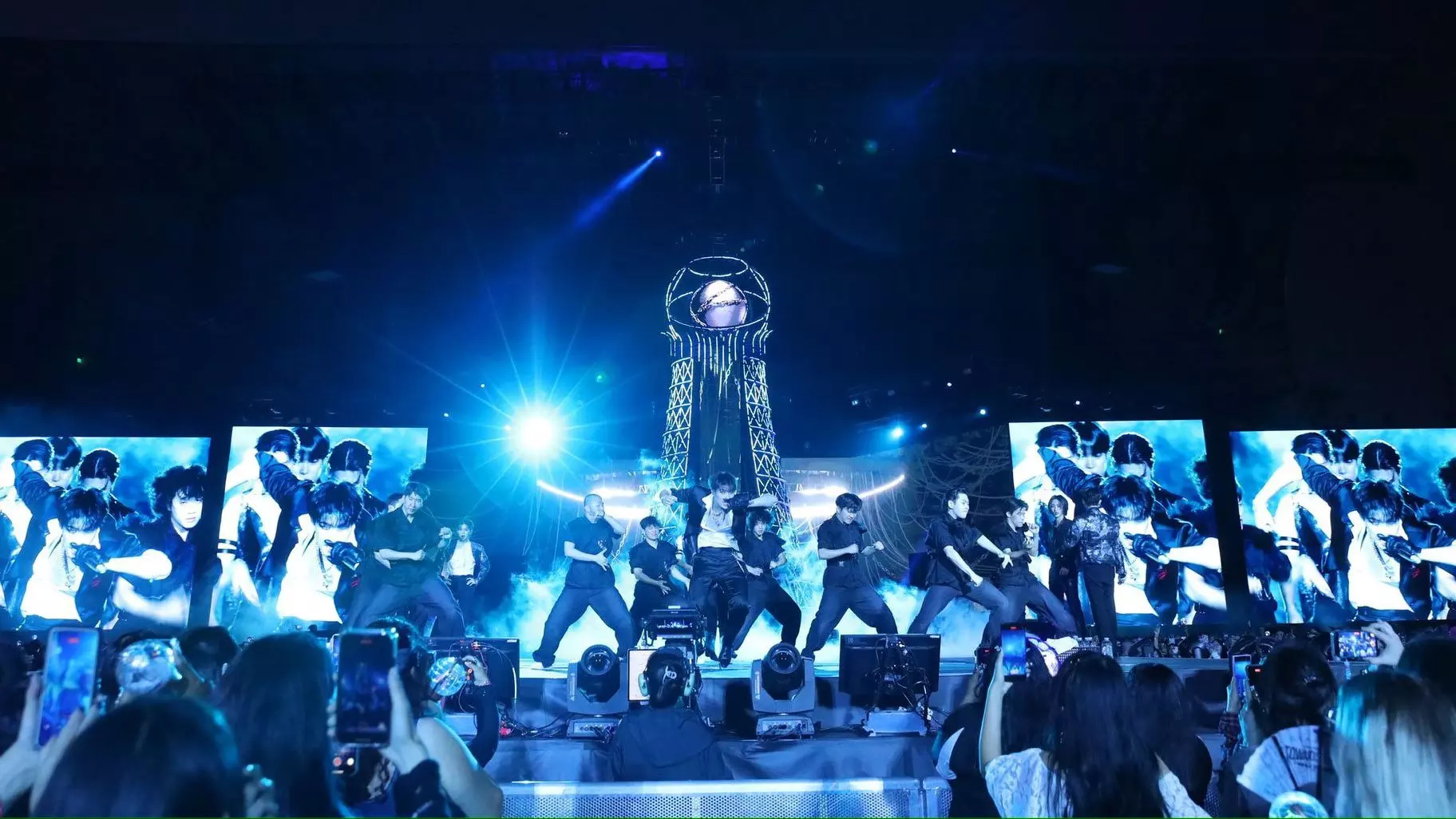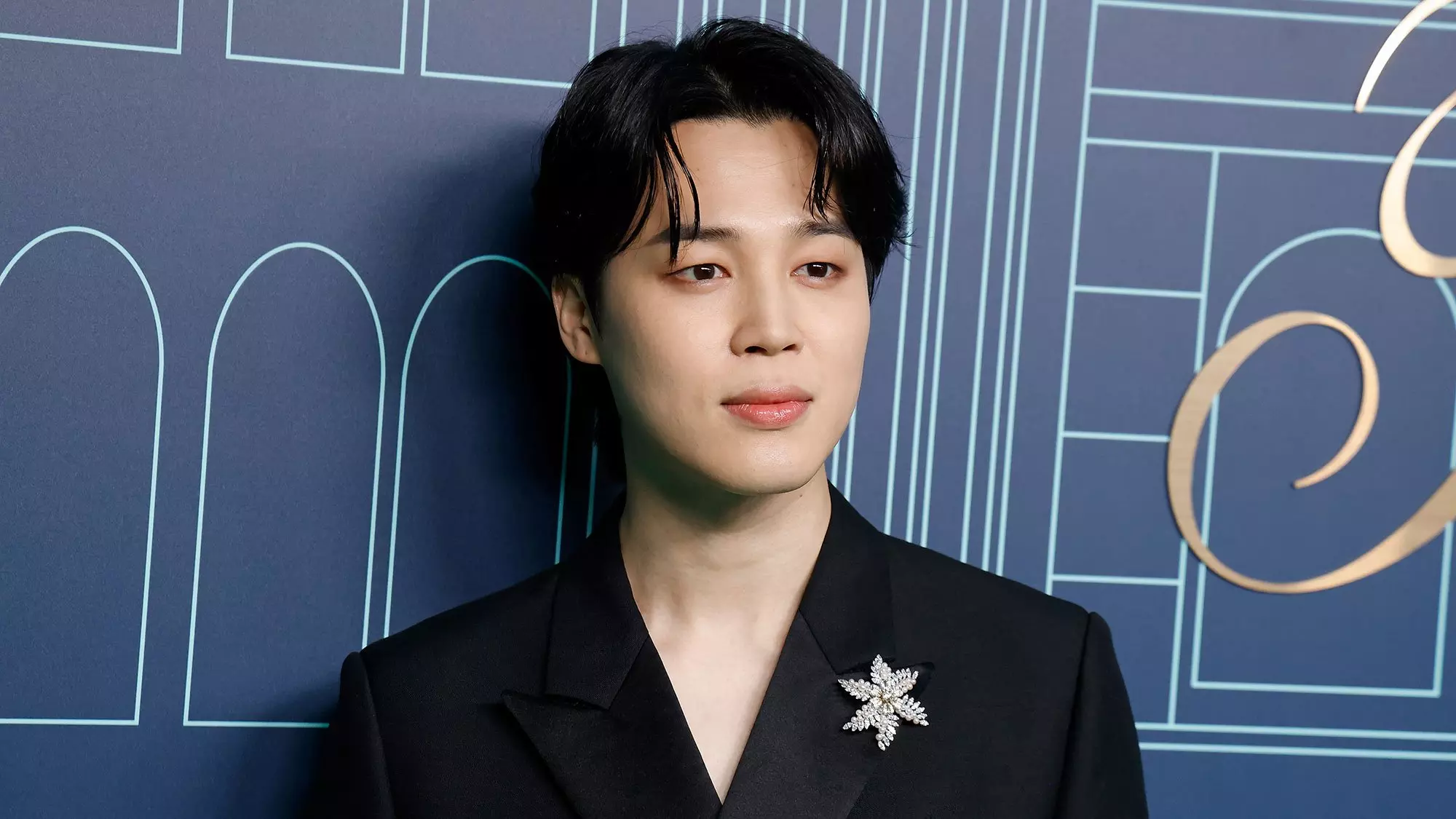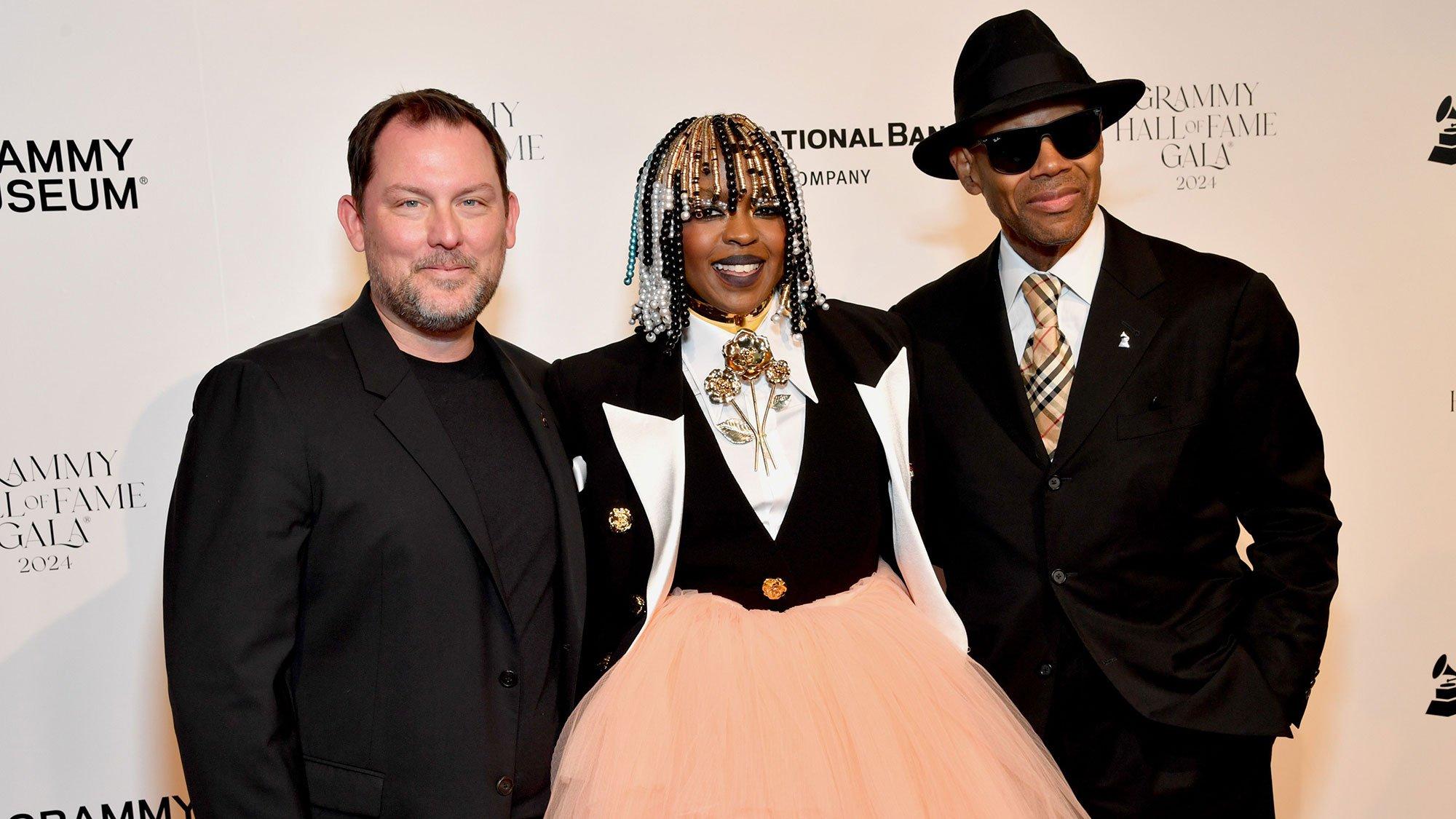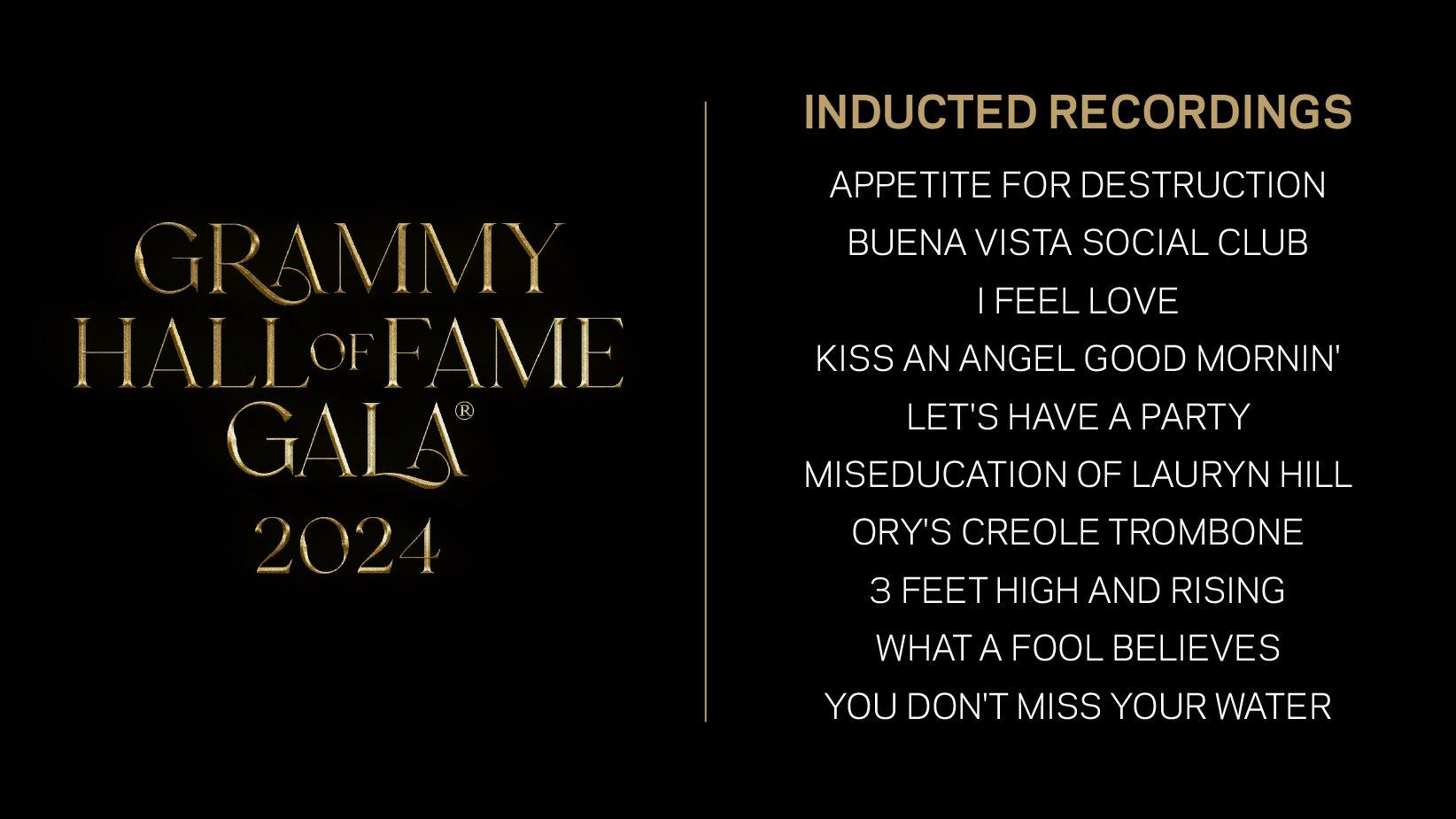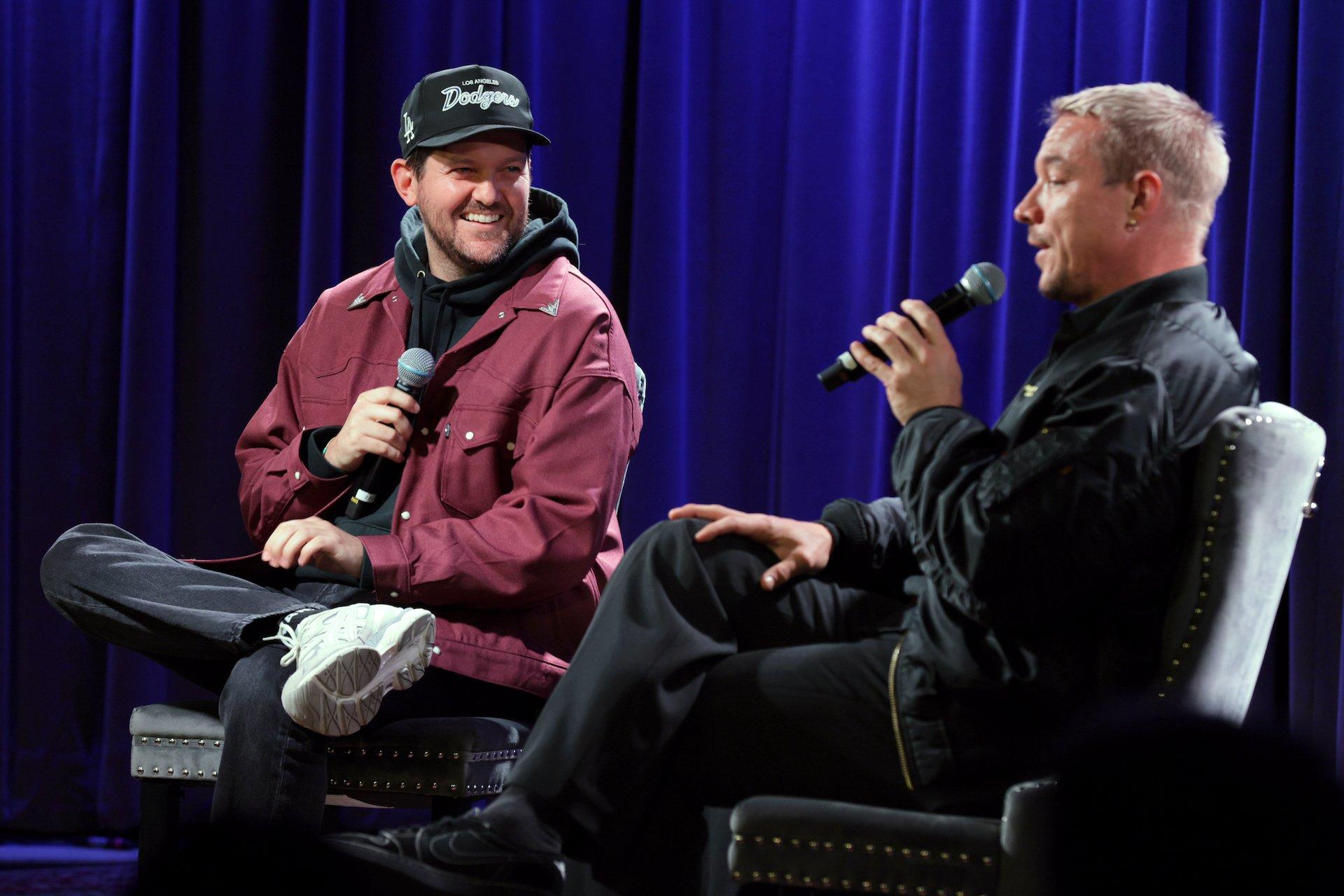As the GRAMMY Hall of Fame celebrates its 50th anniversary, the Recording Academy and GRAMMY Museum are proud to honor the 2024 inductees with the inaugural GRAMMY Hall of Fame Gala, presented by City National Bank, taking place Tuesday, May 21, at the Novo Theater in Los Angeles. This year, the GRAMMY Hall of Fame will induct 10 recordings: four albums and six singles.
This year's class of inductees highlights the diversity and historical significance of recordings that have shaped the musical landscape. From Lauryn Hill's groundbreaking album The Miseducation of Lauryn Hill to the electrifying Appetite For Destruction by Guns N' Roses, the selected recordings span genres and eras and showcase the lasting impact of these timeless works. Other notable inductees include De La Soul's 3 Feet High and Rising, Buena Vista Social Club's self-titled album, and singles by Donna Summer, Charley Pride, Wanda Jackson, Kid Ory's Creole Orchestra, the Doobie Brothers, and William Bell.
The GRAMMY Hall Of Fame Gala promises an unforgettable night, featuring performances that pay tribute to the newly inducted recordings. Artists such as Andra Day, William Bell, Elle King, and HANSON will bring these iconic songs to life while celebrating the rich heritage of the music honored this year. Hosted by veteran CBS journalist Anthony Mason, the evening will also recognize the contributions of Atlantic Records and feature an online auction benefiting the GRAMMY Museum.
The GRAMMY Hall Of Fame was established by the Recording Academy's National Trustees in 1973 to honor recordings of lasting qualitative or historical significance that are at least 25 years old. The inducted recordings are selected annually by a special member committee of eminent and knowledgeable professionals from all branches of the recording arts with final ratification by the Recording Academy's National Board of Trustees. There are currently 1,152 inducted recordings in the GRAMMY Hall Of Fame. Explore the full list of all the GRAMMY Hall Of Fame inducted recordings.
Join us as we honor the 2024 GRAMMY Hall of Fame inductees and celebrate the recordings that continue to resonate with listeners around the world by exploring the newly inducted works in depth below.
Tickets for the inaugural GRAMMY Hall of Fame Gala are available now.
Explore The 2024 GRAMMY Hall Of Fame Inductees
Revisiting 'The Miseducation Of Lauryn Hill': Why The Multiple GRAMMY-Winning Record Is Still Everything 25 Years Later
Remembering De La Soul’s David Jolicoeur, a.k.a. Dave and Trugoy the Dove: 5 Essential Tracks
Guns N' Roses 'Appetite For Destruction' | For The Record
An Ode To Donna Summer's 1970s: How The Disco Queen Embodied Both Innovator And Vixen
Essential Hip-Hop Releases From The 1980s: Slick Rick, RUN-D.M.C., De La Soul & More
For Charley Pride, Black Country Music Was A Self-Evident Truth
Beyoncé To Alison Krauss: 10 Times Women Made GRAMMY History
Love To Love Them, Baby: From Donna Summer To Dua Lipa, Meet The Women Singers Who Shaped (And Continue to Shape) Dance Music
10 Albums That Showcase The Deep Connection Between Hip-Hop And Jazz: De La Soul, A Tribe Called Quest, Kendrick Lamar & More
'The Miseducation Of Lauryn Hill': 25 Facts About The Iconic Album, From Its Cover To Its Controversy
Watch Kenny Loggins And Michael McDonald Take Home A GRAMMY For Song Of The Year For "What A Fool Believes" | GRAMMY Rewind
A History Of Casablanca Records In 10 Songs, From Kiss To Donna Summer To Lindsay Lohan
1968: A Year Of Change For The World, Memphis & Stax Records
Lauryn Hill's 'The Miseducation Of Lauryn Hill' | For The Record
De La Soul, 3 Feet High And Rising
Tommy Boy Records, 1989
Celebrating its 35th anniversary in 2024, 3 Feet High and Rising is the debut studio album from Long Island, New York-born hip-hop trio De La Soul. Released on Tommy Boy Records in 1989 — considered one of the years during hip-hop’s "Golden Age" — and produced by legendary DJ and hip-hop producer Prince Paul, the album was a critical and commercial success. Featuring samples that draw on a vast array of genres — from doo-wop and psychedelic rock to children’s music — the album was unlike any hip-hop album that came before it. Melding inventive production with clever and humorous wordplay and samples from artists as diverse as Johnny Cash (the title of the album is derived from the Cash song "Five Feet High and Rising"), Hall & Oates, Steely Dan, and the Turtles, 3 Feet High And Rising is often considered the beginning of 1990s alternative hip-hop. De La Soul’s use of skits/comedy sketches as interludes also had a huge influence on future generations of rappers. In a review of the album for The Village Voice in 1989, music critic Robert Christgau wrote, "An inevitable development in the class history of rap, [De La Soul is] new wave to Public Enemy’s punk."
Featuring the singles "The Magic Number," "Buddy," "Eye Know," and the GRAMMY-nominated "Me Myself and I," 3 Feet High and Rising spent five weeks at No. 1 on the Billboard Top R&B/Hip-Hop Albums chart. "Buddy" is one of the album’s hallmark songs and features cameos from Q-Tip, Phife Dawg, Jungle Brothers, Queen Latifah, and Monie Love — who are collectively known as the Native Tongues (along with Black Sheep, the Beatnuts and Chi Ali).
The platinum-certified record consistently places on lists of the greatest albums of all time, including in 2023 when Paste magazine featured it at No. 4 on their list of the Greatest Debut Albums of the 1980s. In 2010 it was selected by the Library of Congress for preservation in the National Recording Registry. 3 Feet High and Rising has influenced countless artists, from the Roots and Yasiin Bey to OutKast and Common. With the album's undeniably trailblazing release, Posdnuos, Trugoy the Dove and Pasemaster Mase of De La Soul have cemented themselves as one of the best rap groups of all time.
Kelvin "Posdnuos" Mercer – Artist/Songwriter
David "Trugoy the Dove" Jolicoeur – Artist/Songwriter
Vincent "Maseo" Mason – Artist/Songwriter
"Prince Paul" Huston – Producer/Engineer/Songwriter
Alan Watts – Engineer/Mixer
Guns N’ Roses, Appetite For Destruction
Geffen, 1987
Guns N’ Roses’ Appetite For Destruction LP will go down in history as one of the most iconic and influential rock albums ever made. But when it was released in the summer of 1987, Appetite didn’t initially garner much mainstream attention. Once the band hit the road in support of the album, singles "Welcome to the Jungle", "Paradise City" and "Sweet Child O' Mine" started getting significant airplay. By the summer of 1988, the band found themselves with a No. 1 album on the Billboard 200. Appetite For Destruction became the best-selling album of all time in the U.S. and the best-selling debut album. In a review for Pitchfork, Maura Johnston said, "The debut from Guns N' Roses was a watershed moment in '80s rock that chronicled every vice of Los Angeles led by the lye-voiced Axl Rose and a legendary, switchblade-sharp band."
Produced by Mike Clink, Appetite for Destruction is widely considered a near perfect album where the deep cuts are just as good as the hits. From the opening roar of "Welcome to the Jungle" and the iconic "Sweet Child O’ Mine," to "It's So Easy," "Nightrain," "You're Crazy," and "Mr. Brownstone," the album is an artistic triumph in sound, songwriting and production, earning its place at No. 62 on Rolling Stone’s list of the 500 Greatest Albums of All Time. In many ways, the album changed the world. In a 2018 article for Revolver, Dan Epstein noted that Appetite ushered in a new wave of bands like the Black Crowes with its "blues-based music played by an unflashy yet hard-swinging rhythm section, a rock-solid rhythm guitarist, a flashy-but-soulful lead player and a charismatic vocalist who exuded danger and decadence." It also paved the way for Nirvana and the arrival of grunge as rock fans’ "ears were primed for more raw, real and rebellious hard rock." Now, nearly 40 years since its release, Appetite for Destruction has sold over 30 million copies worldwide and is without a doubt one of the most successful debut albums of all time.
Axl Rose – Artist/Songwriter
Slash – Artist/Songwriter
Duff McKagan – Artist/Songwriter
Steven Adler – Artist/Songwriter
Izzy Stradlin – Artist/Songwriter
Mike Clink – Engineer/Producer
Steve Thompson – Mixer
Buena Vista Social Club, Buena Vista Social Club
World Circuit/Nonesuch, 1997
In 1996, a group of veteran Cuban musicians was assembled to record an album that would pay tribute to Cuba’s "musical golden age" of the 1930s to 1950s. Showcasing styles of music that were popular at the time, such as son, bolero and danzón, the group became known as the Buena Vista Social Club, named after a 1940s-era members-only music club that was located in the Buenavista quarter of Havana. Organized by British music producer and executive Nick Gold and produced by GRAMMY-winning American guitarist Ry Cooder and Cuban director Juan de Marcos Gonzalez, Buena Vista Social Club recorded their eponymous 14-track debut album in just six days. Released in September 1997, the album featured 20 of Cuba’s most prominent musicians, including vocalist Ibrahim Ferrer (1927–2005), pianist Rubén González (1919–2003), and vocalist/guitarist Compay Segundo (1907–2003). Buena Vista Social Club was an instant hit with tracks such as the four-chord song "Chan Chan," written by Segundo, and a rendition of the romantic criolla "La Bayamesa." Everything fell into place at the right time for this album — from the chemistry between the musicians to the rich music history of Havana — to create one of the moments that can only be described as pure musical magic. Buena Vista Social Club sold more than 1 million copies, earned a spot on the Billboard 200, and won the GRAMMY Award for Best Tropical Latin Performance.
In 1998 the ensemble held performances in Amsterdam and New York that were captured on film by German director Wim Wenders. Along with interviews with musicians that were conducted in Havana, a documentary, titled Buena Vista Social Club, was released in 1999 and earned an Oscar nomination for Best Documentary (Feature). In 2003, Buena Vista Social Club was named on Rolling Stone’s list of the 500 Greatest Albums of All Time, and in 2022, it was selected by the Library of Congress for preservation in the National Recording Registry. Further cementing its place in the music history books, Buena Vista Social Club was recognized by Guinness World Records as the best-selling album of world music with more than 8 million copies sold worldwide.
Ry Cooder – Leader/Producer
Juan Demarcos Gonzalez – Director
Larry Hirsch – Engineer
Jerry Boys – Engineer/Mixer
Donna Summer, "I Feel Love"
Casablanca, 1977
When the Queen of Disco, Donna Summer, released her hit single "I Feel Love" in 1977, it propelled Brian Eno (who was in the studio with David Bowie at the time) to rush in and declare, "This single is going to change the sound of club music for the next 15 years." Now, more than 40 years after its release, "I Feel Love" definitely changed something – it changed pop music forever. Recorded with producers Giorgio Moroder and Pete Bellotte, the goal was to create a song that signified the future — and it did. "I Feel Love" was the first song to pair repetitive synthesizer loops with four-on the-floor bass drum and an off-beat hi-hat, helping to forge the path for synth pop, New Romantics, Italo disco, Hi-NRG, electro, house, techno, and more. Along the way, the global smash influenced countless artists, including Blondie, who became one of the first punk-associated groups to embrace disco, releasing "Heart of Glass" the following year.
Upon its release, "I Feel Love" reached No. 1 in several countries, including the UK, and peaked in the Top 10 on the Billboard 200. In 2012, the Library of Congress selected it for preservation in the National Recording Registry. Many of today’s biggest artists have paid tribute to Summer’s groundbreaking track with covers or samples, including Madonna, Red Hot Chili Peppers, Bronski Beat, and Beyoncé, the latter of whom samples "I Feel Love" on "Summer Renaissance," the closing track on her 2022 GRAMMY-winning album Renaissance. To this day, "I Feel Love" is considered the No. 1 greatest dance song of all time (Rolling Stone).
The song's impact on the LGBTQ+ community is equally as great as its impact on the dance community. GRAMMY-winning artist Sam Smith, who released a cover of "I Feel Love" in 2019, wrote on X: "As a queer person, ‘I Feel Love’ has followed me to every dance floor in every queer space from the minute I started clubbing. This song, to me, is an anthem of our community." In 2023, Pride Life Global ranked the track as one of the best gay anthems.
Donna Summer – Artist/Songwriter
Giorgio Moroder – Producer/Songwriter
Pete Bellotte – Producer/Songwriter
Jürgen Koppers – Artist/Songwriter
Charley Pride, "Kiss An Angel Good Mornin'"
RCA Victor, 1971
"Kiss An Angel Good Mornin’" is GRAMMY winner Charley Pride’s biggest hit of his career. Released in 1971 as the first single from his GRAMMY-winning album Charley Pride Sings Heart Songs, the song peaked at No. 21 on the Billboard Hot 100, his only single to break the Top 40. Considered one of Pride’s signature songs, the track marked his eighth single to top the Billboard Hot Country Songs chart and became one of the biggest country hits of the decade. "Kiss An Angel Good Mornin’" was produced by Cowboy Jack Clement (Waylon Jennings, Willie Nelson, Dolly Parton) and written by Ben Peters, who got the inspiration for the song after he and his wife Jackie welcomed their daughter Angela. It’s a song purely about love and a slight departure from Pride’s other hits, such as "I’m Just Me" and "I’d Rather Love You." In a 2021 article for CMT, Marcus K. Dowling writes, "The achievement of conveying life's simple joys with a magnificent voice over complex countrypolitan rhythms and melodies — instead of discussing complex emotions over those same types of tracks — is the greatest victory of Pride's signature song." The single also earned Pride a GRAMMY nomination for Best Country Vocal Performance, Male. Since its release, "Kiss An Angel Good Mornin’" has been covered by countless artists, including George Jones, Conway Twitty, Gene Stuart, and Roy Clark — all of whom released the song in 1972 — along with Percy Sledge, Alan Jackson and Heather Myles.
When he signed with RCA in 1964, Pride became the first Black country music singer to get a major record label deal. He went on to have 29 No. 1 hits on the Billboard Hot Country Songs chart, selling more than 70 million records. When it comes to sales for RCA, he is second only to Elvis Presley. Though he passed away in December 2020, Pride’s impact on country music, especially Black country music artists, remains. His influence can be heard in the music of up-and-coming artists such as Brittney Spencer, Mickey Guyton and Shy Carter. As country music’s first Black superstar, Pride and his warm baritone captivated audiences, broke racial and cultural barriers, and earned him an induction into the Grand Ole Opry in 1993.
Charley Pride – Artist
Jack Clement – Producer
Ben Peters – Songwriter
Ray Butts – Artist
Mike Shockley – Producer
Wanda Jackson, "Let's Have A Party"
Capitol, 1960
Originally recorded by Elvis Presley for the 1957 musical/romance film Loving You, "Let’s Have a Party" was recorded by Wanda Jackson and released on her eponymous debut album in 1958. After Jackson’s version of "Let’s Have a Party" was discovered by an Iowa disc jockey and received an increase in interest from radio listeners, Capitol Records encouraged Jackson to release the song as a single two years later in 1960. The song became a hit, making the Top 40 in the U.S. and topping the chart in the U.K. The success of "Let’s Have a Party" inspired Jackson to rename her band the Party Timers and Capitol subsequently released the compilation album, Rockin’ With Wanda that same year. As one of the first women to have a career in rock and roll, Jackson recorded a series of singles in the 1950s that helped earn her the nickname of The Queen of Rockabilly. It was Elvis, with whom she toured with in 1955, who encouraged her to record in the rockabilly style.
In 2005, Jackson received the Fellowship Award from the National Endowment for the Arts, becoming the first female country and rock artist to receive the honor. In 2009, after several artists advocated on her behalf — including Elvis Costello, Bruce Springsteen and Cyndi Lauper — Jackson was inducted into the Rock and Roll Hall of Fame. Lauper has cited Jackson as one of her earliest influences, recording a cover of "Funnel of Love" for her 2016 album Detour. Other artists who have listed Jackson as an influence include Adele and Elle King.
Lauper told Rolling Stone in 2016: "I think for country you look at Patsy Cline or Loretta Lynn who played a guitar, or sang the songs she wrote, and Dolly Parton. But Wanda Jackson was a rocker, and so, of course, I was going to listen and learn from her because I was a rocker and that's what we did."
Jackson is also a member of the Rockabilly Hall of Fame, the Iowa Rock and Roll Hall of Fame, the Oklahoma Hall of Fame, and the Oklahoma Country Music Hall of Fame. In 2010, she was the recipient of the Lifetime Achievement Award from the Americana Music Honors.
Wanda Jackson – Artist
Ken Nelson – Producer/Engineer
Jesse Mae Robinson – Songwriter
Kid Ory’s Creole Orchestra (As Spike’s Seven Pods Of Pepper Orchestra), "Ory's Creole Trombone"
Nordskog, 1922
Louisiana-born composer, trombonist and bandleader Edward "Kid" Ory put New Orleans jazz on the map. Kid Ory’s 1922 hit "Ory’s Creole Trombone" was the first recording of Black/Creole New Orleans jazz. Recorded in Los Angeles, the single features Ory on trombone, along with Thomas "Papa Mutt" Carey on cornet, Oliver "Dink" Johnson on clarinet, Fred Washington on piano, Ed "Montudie" Garland on bass, and Ben Borders on drums. Upon release, the entire first pressing of 5,000 records sold out, leading to gigs for Ory and his band down the California coast in San Diego and Tijuana.
Born on Christmas Day in LaPlace, Louisiana, Ory led a band early on in his career in New Orleans that featured music legends such as Joe "King" Oliver, Johnny Dodds, Johnny St. Cyr and, later, Louis Armstrong. Ory relocated to Los Angeles after the prohibition of alcohol in 1919 changed the landscape for jazz musicians performing in New Orleans nightclubs. Many of the musicians who played on his L.A. sessions had also recently relocated from New Orleans. After moving to Chicago in 1925, where jazz was just starting to gain traction, Ory worked and recorded with artists such as Armstrong, Jelly Roll Morton, Bessie Smith, Ma Rainey, and many others. He was an original member of Louis Armstrong and His Hot Five, with whom he would later re-record "Ory’s Creole Trombone" in 1927. As demonstrated on "Ory's Creole Trombone," Ory was an early adapter of the glissando technique, now a central element of New Orleans jazz. While he might not have been the first to play a glissando on a trombone, he was certainly the most influential.
In 2005, "Ory’s Creole Trombone" was selected by the Library of Congress for preservation in the National Recording Registry. In an essay written upon the recording's selection by the Library of Congress, GRAMMY-nominated musician and jazz historian David Sager wrote, "‘Ory’s Creole Trombone’ offers a rare glimpse into the origins of New Orleans jazz and a remarkable insight to this music’s durability and universal appeal." A pioneering record and one of the most essential jazz recordings, "Ory’s Creole Trombone" helped define the New Orleans style of jazz and served as the prototype for future musicians of that genre.
Edward "Kid" Ory – Artist/Songwriter
Lauryn Hill, The Miseducation Of Lauryn Hill
Ruffhouse Records / Columbia Records, 1998
Widely considered one of the greatest albums of all time, The Miseducation of Lauryn Hill is the debut album and only solo studio set released by GRAMMY-winning singer and rapper Lauryn Hill. The album debuted at No. 1 on the Billboard 200 and sold more than 422,000 copies in its first week, breaking the record for first-week sales by a female artist. Credited for bringing hip-hop and neo-soul to the forefront of popular music, the album earned Hill 10 GRAMMY nominations, which now has her tied with Beyoncé for the Guinness World Record for most GRAMMY nominations in a single year for a female artist. Hill turned half of those nominations into wins, taking home the awards for Album Of The Year, Best New Artist, Best R&B Album, and Best Rhythm & Blues Song and Best Female R&B Vocal Performance for "Doo Wop (That Thing)." With lyrics that present arguably the most poignant of female perspectives on life, love and relationships, while also touching on the turmoil within her former group the Fugees, three of the album’s singles — "Everything Is Everything, "Ex-Factor" and "Doo Wop (That Thing)" — peaked in the Top 40 on the Billboard 200, with the latter claiming the top spot.
The Miseducation of Lauryn Hill was partially recorded at Bob Marley’s studio Tuff Gong Studios in Kingston, Jamaica, while Hill was pregnant with her first son, Zion. Speaking about that time, Hill told Rolling Stone, "When some women are pregnant, their hair and their nails grow, but for me it was my mind and ability to create. I had the desire to write in a capacity that I hadn't done in a while. I don't know if it's a hormonal or emotional thing ... I was very in touch with my feelings at the time." The album’s track "To Zion," which features Carlos Santana on guitar, is a song about her son.
In 1999, Hill became the first hip-hop artist to appear on the cover of TIME magazine. Now, more than 25 years since its release and with more than 20 million copies sold, The Miseducation of Lauryn Hill continues to be one of the most influential albums ever made.
Lauryn Hill – Artist/Producer/Songwriter
Gordon "Commissioner Gordon" Williams – Engineer
Tony Prendatt – Engineer
The Doobie Brothers, "What A Fool Believes"
Warner Bros. Records, 1978
One of the few non-disco songs to hit No. 1 on the Billboard Hot 100 in 1979, the Doobie Brothers’ "What a Fool Believes" is featured on their 1978 eighth studio album, the Album Of The Year-nominated Minute by Minute. Co-written by Michael McDonald and Kenny Loggins, "What a Fool Believes" won the Doobie Brothers two GRAMMY Awards, including Record Of The Year. Stylistically speaking, the song is unlike anything the Doobie Brothers had done before.
"What a Fool Believes" started off as a piano piece idea McDonald had. Producer Ted Templeman heard what he was working on and encouraged him to put some lyrics down with a co-writer. It turns out that McDonald and Loggins had talked about working together for some time. When they got together at McDonald’s house in Los Angeles to write, Loggins had already come up with the song’s hook — "she had a place in his life." Telling the story of a man who attempts to rekindle a romantic relationship, "What a Fool Believes" is about the lies we sometimes tell ourselves about past romances. When the protagonist in the song attempts to reconnect with an old love, he realizes that he barely registers in the woman’s mind. The Doobie Brothers and Templeman recorded numerous takes of its rhythm track over five or six days, but they couldn’t land on a version they all liked. Templeman eventually decided to cut up the master tape of a recording into sections. "In those days when you cut the tape, you’re over – that’s the master of your recording," recalled Templeman in an interview with The Guardian in 2022. "But we got lucky and I put it together on the spot." McDonald completed the rest of the arrangement, adding keyboards, vocals and strings. Before it was released by the Doobie Brothers, Loggins released his own jazzier and experimental version of the song on his 1978 album Nightwatch.
"What a Fool Believes" was rated as the Doobie Brothers’ all-time greatest song by Ultimate Classic Rock critic Michael Gallucci and listed on Rolling Stone’s Top 500 Greatest Songs of All Time list. Today, "What a Fool Believes" is considered a "foundational yacht rock classic," as Tom Breihan wrote in a review for Stereogum in 2020.
Jeff "Skunk" Baxter – Artist
John Hartman – Artist
Keith Knudsen – Artist
Michael McDonald – Artist/Songwriter
Tiran Porter – Artist
Patrick Simmons – Artist
Ted Templeman – Producer
Kenny Loggins – Songwriter
Donn Lander – Engineer
William Bell, "You Don’t Miss Your Water"
Stax Records, 1961
As the first male solo act signed to the legendary Stax Records, Memphis-born GRAMMY-winning singer/songwriter William Bell released his solo debut with the melancholy "You Don’t Miss Your Water" in 1961. Recorded as a demo with members of the Mar-Keys and MG’s, "You Don’t Miss Your Water" was originally released as a B-side of his single "Formula of Love" and gained steam after DJs flipped the record over and started playing "You Don’t Miss Your Water." The song became the first hit for Stax Records, charting on the Billboard Hot 100 in 1962. It was later released on Bell’s 1967 album The Soul of a Bell and remains his best-known recording to this day.
"The message is universal: appreciate what you have," said Bell in a 2022 interview with Uncut magazine. "Back then I didn’t realize what I was writing, but after I got a little older, I realized that although the world changes physically, every generation has the same wishes, desires and aspirations. If you just write truthfully about life and write things you think will help people, it will resonate."
And indeed, the song did resonate. More than six decades since its release, "You Don’t Miss Your Water" has gone on to become a Southern classic. Countless artists have recorded covers of it, including Otis Redding, Percy Sledge, Taj Mahal, Jerry Lee Lewis, the Black Crowes, Sturgill Simpson, Peter Tosh & the Wailers, Brian Eno, and, most notably, the Byrds, on their seminal 1968 country-rock album Sweetheart of the Rodeo.
In 2013, Bell performed "You Don’t Miss Your Water" before President Barack Obama during "In Performance at the White House: Memphis Soul." The following year, Bell was featured in the documentary Take Me to the River, reflecting upon American music's soul. He was inducted into the Memphis Music Hall of Fame in 2016. In 2020, the National Endowment for the Arts celebrated him as a Heritage Fellow. Bell was instrumental in ushering in the Southern soul music genre, which is now known as the globally influential "Memphis Sound."
William Bell – Artist/Songwriter
Chips Moman – Producer
Explore The History Of The GRAMMY Hall Of Fame

